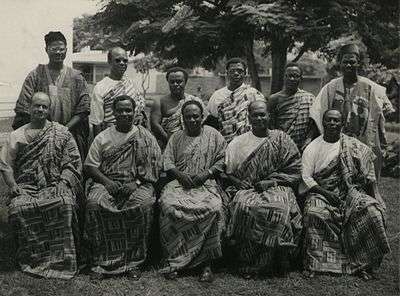Archie Casely-Hayford
Archibald "Archie" Casely-Hayford (1898 – August 1977) was a British-trained Ghanaian barrister and politician, who was involved in nationalist politics in the former Gold Coast (present-day Ghana). Having joined the Convention People's Party (CPP), in 1951 he was elected Municipal Member for Kumasi and was appointed by Kwame Nkrumah Minister of Agriculture and Natural Resources in the government of the First Republic.[1] When Nkrumah declared Ghana's Independence on 6 March 1957, he was photographed on the podium flanked by Casely-Hayford, together with Kojo Botsio, Komla Agbeli Gbedemah, Nathaniel Azarco Welbeck and Krobo Edusei.[2]

Biography
Archie Casely-Hayford was born in Axim, Gold Coast, to Beatrice Madelene (née Pinnock) and respected pan-Africanist Joseph Ephraim Casely Hayford.[3] Archie was educated at Mfantsipim School, Cape Coast, and then in Britain at Dulwich College, London. He subsequently studied at Clare College, University of Cambridge, receiving an MA degree in law and economics.[4]
After returning home to the Gold Coast, he practised as a lawyer from 1921 until 1936. He became a member of Sekondi Town Council in 1926, and was made a district magistrate in 1936, rising to be senior district magistrate by 1948, before resuming private legal practice.[4]
Entering nationalist politics, he joined Kwame Nkrumah's Convention People's Party (CPP), and before the 1951 elections acted as defence counsel for Nkrumah and other CPP leaders,[4] thereby earning the title "Defender of the Verandah Boys".[5] In Nkrumah's first government Casely-Hayford was appointed Minister of Agriculture and Natural Resources in 1951,[1] and later became Minister of Communications and, in 1954, Minister for the Interior.[4][6]
Casely-Hayford was honoured by Ghana with the Grand Medal and was awarded the Queen's Coronation Medal from Britain.[4]
At the time of his death in 1977 he held the post of Chancellor of the University of Cape Coast.[4] In the years prior, he also had been serving as the head of the wider Casely-Hayford family.
References
- "The men who flanked Nkrumah on Independence eve" Archived 9 November 2018 at the Wayback Machine, National Commission on Culture, 14 April 2007.
- "CPP Salutes 'True Big Six'...on 59th anniversary of the Convention People’s Party", GhanaWeb, 13 June 2008.
- Nancy J. Jacobs, African History through Sources, Volume 1, Cambridge University Press, 2014, pp. 153–54 (reproduces photograph of Archie Casely-Hayford with his father from David Kimble's A Political History of Ghana, Oxford: Clarendon, 1963).
- Casely-Hayford, A., Makers of Modern Africa: Profiles in History, London: Africa Journal Ltd for Africa Books Ltd, 1981, p. 125.
- David Owusu-Ansah, "Casely-Hayford, Archie", in Historical Dictionary of Ghana, Rowman & Littlefield, 2014, p. 82.
- Kodwo Mensah, "Archie As I Knew Him", Daily Graphic, Issue 8355, 30 August 1977.
External links
- Marc Woons, "Inspiring Visit to Kwame Nkrumah Memorial Park" – includes Independence Day photograph.